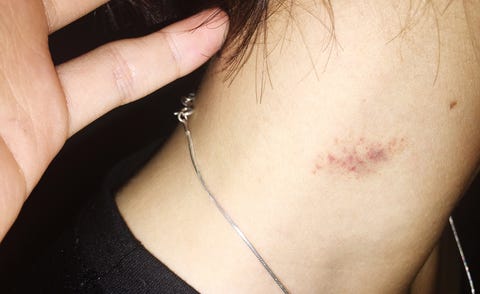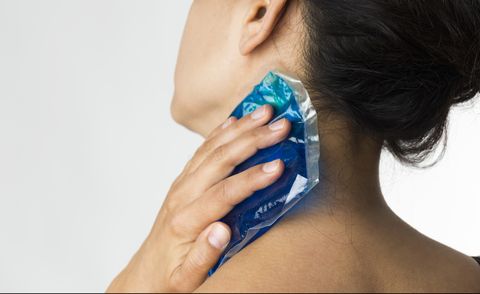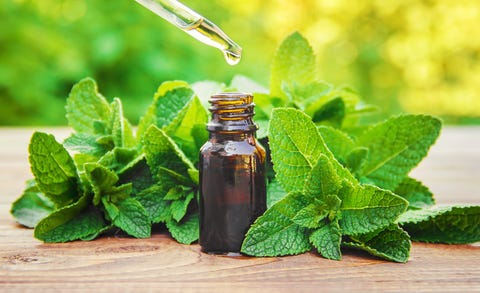How to Get Rid of a Small Hickey
As a teenager, a hickey is worn almost as a badge of honour – a visible display of your immense sexual prowess (or so you like to think). As an adult, however, the vision of a splotchy purple mark in the mirror offers far less prestige. If anything, you're left wondering how to get rid of a hickey in record time.
While it might feel super hot in the moment, dealing with a hickey or 'love bite' after an overly-enthusiastic romantic rendezvous can be an embarrassing task. But you needn't confine yourself to turtlenecks and scarves for the next fortnight, because there are ways to minimise the appearance of that unsightly bruise and keep your ego intact.
We spoke to Dr Kathy Taghipour, consultant dermatologist at DermConsult, Abbas Kanani, pharmacist at Chemist Click and Rachael Burns, consultant dermatologist at Sönd Skin, about what a hickey is, how long they last and how to quickly hide your unsightly love bites:
What is a hickey?
A hickey is technically a passion-induced bruise. 'Hickeys are bruises that form on the skin after small skin vessels are injured because of suction or biting,' says Dr Taghipour. 'When these vessels break, the blood leaks out and is stored under the skin, causing a black or blue discolouration.'
Intense sucking can cause a hickey that can last 2 weeks, while less intense pressure can cause a hickey that lasts for 2-3 days.
Over time, the trapped blood breaks down and is reabsorbed by your body, changing colour as it does. You'll probably notice your hickey is cherry red initially, before turning darker over the next two days as the hemoglobin in your blood loses oxygen. By day five, it'll start to fade, and within a week or two, it'll turn yellow-ish before disappearing entirely.

Getty Images
How long does a hickey last?
The length of time you can reasonably expect a hickey to last depends on a few factors, including the current state of your general health and also whether or not you choose to treat it. For example, people who don't get enough iron, vitamin C or vitamin K in their diet tend to bruise easier.
But primarily, it depends on the extent of the trauma caused to the area, says Kanani – ie how vigorously the other person sucked your neck. 'Intense sucking on the area can cause a hickey that can last around two weeks, while less intense pressure can cause a hickey that lasts for two or three days,' he says.
11 ways to get rid of a hickey
If you're wondering how to get rid of a hickey, there are a few tried-and-tested methods to draw from. While none of them will totally eradicate a love bite, they'll certainly help to contain the damage and calm the inflammation in the area, soothing both your tender neck and crimson face. Here's what you need to know:
1. Cold compress
This classic bruise-quelling tactic is usually the go-to treatment for a hickey, says Kanani. 'It will reduce inflammation and the flow of blood around the area,' he says. 'Try to use a small compress of blocks of ice. You may even wish to put a spoon in the freezer and use the back.' It's best applied within the first 24 hours, ideally for 10 minutes several times a day – and in private, since it'll temporarily turn your surrounding skin red 'which can draw attention to the area,' says Kanani.

solidcolours
2. Warm compress
To diminish the risk of a lasting hickey, don't ice the area for longer than 24 hours. After that window, the deep chill loses its magic, and you'll be better off switching to a warm compress to boost blood flow, reduce pain and speed up the healing process. This could be a warm flannel, a hot water bottle, or a microwaveable heat pad.
3. Aloe vera
Dig out that rogue tube of aloe vera gel from the back of the bathroom cabinet – it could be your skincare saviour. 'Aloe vera pulp has been shown to help reduce inflammation and swelling on the skin's surface,' says Burns. 'Add a thin layer of aloe vera pulp to the bruised area twice a day for seven consecutive days.' Go easy at first, she says, before you 'to ensure your skin isn't overly sensitive before applying the pulp multiple times per day.'
Aloe vera pulp has been shown to help reduce inflammation and swelling on the skin's surface.
4. Vitamin K cream
Vitamin K is important for blood clotting, so it could help expedite the departure of your sexy souvenir. 'There is some evidence that vitamin K cream can speed up the healing of a bruise,' says Dr Taghipour. 'Most studies have been done in people who had treatment with lasers and developed bruises afterwards. The evidence is stronger for a concentration of five per cent vitamin K in creams.' Apply it directly to the skin once or twice a day.
5. Pineapple
Some people swear applying fresh pineapple to the hickey is the trick to eradicating it, although the science behind this is somewhat shaky. 'Pineapples contain a group of enzymes called bromelain,' says Kanani, which prompt your body to produce substances that fight pain and swelling. 'Eating pineapples may help, I am not too sure about the effect that rubbing a pineapple slice would have,' he says. 'The evidence is limited.'
6. Massage
A tactical self-massage can be extremely beneficial for relieving pain and boosting blood flow to the area – but there is a caveat. Rub too intensely and you'll make the bruising worse, not better, which will only prolong your hickey saga. Go gentle, and massage the area for just a few minutes at a time. Other than that, keep your hands off your neck – your body needs time to repair the broken capillaries. Constant prodding could even cause scarring. You have been warned.

Yana Tatevosian
7. Peppermint oil
While it won't prevent a hickey from worsening, the essential oil could speed up the healing process. 'The primary compound in peppermint oil that makes it effective in treating a hickey is menthol, as it stimulates blood flow to the area,' says Burns. 'Add one or two drops of peppermint oil to 15 drops of almond oil and massage the oil into the area gently.' Using a carrier oil is essential, since essential oils like peppermint can irritate the skin if applied undiluted. Do a skin test first if you're unsure.
8. Vitamin C cream
Vitamin C plays a role in collagen production – the protein that gives skin strength and elasticity. Some believe applying a vitamin C cream directly to the hickey can speed up the healing process, although there's currently no scientific backing to this. 'While topical vitamin C has been used as an anti-ageing, there is no evidence that it will help bruising immediately,' says Dr Taghipour. 'The bruise is more likely to have disappeared before topical vitamin C takes effect.' Still, if you've got some to hand, it could be worth a try.
Arnica is thought to work by encouraging blood cells to disperse the build-up of fluid around bruising.
9. Arnica cream
Arnica is a herb that has long been used as medicine to treat bruising, so it could be effective on a hickey, too. It's available over-the-counter, usually in the form of a topical cream or gel. 'Arnica is thought to work by encouraging blood cells to disperse the build-up of fluid around bruising, which causes inflammation,' says Kanani. 'The aim of arnica is to induce an immune response to bruising and inflammation from physical injury.'
10. Cocoa butter
There's a reason cocoa butter – a type of edible fat extracted from cocoa beans – is a skincare staple: it's rich in skin-healing fatty acids and compounds. 'Cocoa butter has been shown to be an effective treatment in treating scars, stretch marks and also hickeys,' says Burns. 'Apply cocoa butter to the bruised area twice each day for a period of two weeks.'
11. Laser treatment
If you have particularly deep pockets and really can't wait a few weeks, there are specialised laser treatments that can blast your hickey away. The lasers fragment red blood cells into small pieces, prompting your white blood cells to carry them away quicker. The result? The hickey is gone in around 48 hours (along with several hundred pounds). If you're considering this remedy, speak to your dermatologist.
Last updated: 01-04-2021
This content is created and maintained by a third party, and imported onto this page to help users provide their email addresses. You may be able to find more information about this and similar content at piano.io
How to Get Rid of a Small Hickey
Source: https://www.netdoctor.co.uk/healthy-living/sex-life/a35991901/hickeys/